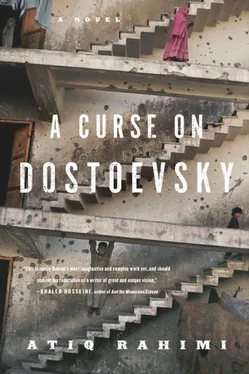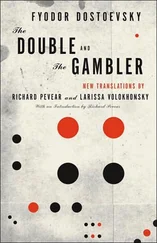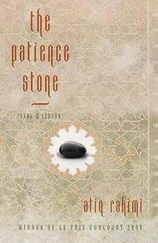“So, are we in this valley?” asks Hakim, making the smokers laugh.
“If, instead of asking stupid questions, you manage to stupefy us with your hashish, then YES!” says Kaka Sarwar, taking a long drag on the chillum and passing it to Jalal, who has come back to life: “So the war hasn’t started.”
“It’s already finished. Smoke, smoke and chill out!” reassures Mustapha. Then, to Rassoul: “He’s scared of the war, you see. He’s afraid of blood and bullets and rockets. That’s why he’d rather kill himself smoking than die in the war. We’ve been staggering from one saqi-khana to the next for four days now.”
The chillum has gone out. Jalal looks up, completely wasted: “Is it finished?”
“The war? Yes.”
“No, the hash…”
Hakim moves forward to pass him another pipe. “Do you have the money?”
“Money… Mustapha, have you…?”
“No, dear Jalal. Our pockets are as dry as our arses.”
Rassoul stands up unsteadily, pulls a 500-afghani note from his pocket, and gives it to Jalal. Everyone stares at him in shock and admiration. He takes out another 500 and gives it to Hakim to buy everyone a kebab.
They all thank him loudly. He leaves the smoking den feeling proud and light. Lighter than air. What joy! From now on he’s going to live on Rostam’s money as he could have lived on Nana Alia’s. In dignity and happiness.
Now I’m going to find Sophia. I’m going to take her in my arms. We’ll be married. I will take her—take both our families—far away, far beyond this realm of terror.
He runs.
A rocket shakes the earth under his feet.
He runs.
Nothing holds him back. Not gunshot, not traffic, not the pain in his ankle.
Nothing affects him. Not cries, not tears, not the calls for help.
He only stops when he reaches Sophia’s house. He pauses a moment to regain his breath, then knocks on the gate.
After a long silence it opens. Dawoud. Hey, he’s not on the roof! “The pigeons don’t fly at this time of day.” Dawoud closes the gate behind them and follows Rassoul in a state of great excitement. “My pigeon came back. As soon as you left, it came back. I think it flew a long way.” He laughs nervously. “I’ve already swapped it for…” Happy and proud, he heads to the corner of the courtyard, takes something from under the pigeon cage, and brings it to Rassoul. “Look, this is what I swapped it for…” A Colt. “In good condition!” says Dawoud. Rassoul checks the magazine; it is loaded. “I got it for you…” For him? What is he supposed to do with it? “Everybody has one, except you! If you have one, you won’t die. Hide it so that my mother doesn’t see it.” Dawoud takes it from him anxiously, and conceals it under his shirt. “Your cousin came by. He was looking for you. He said he was going to Mazar.” Rassoul walks down the passage and sees a light on in the kitchen. He walks in and greets Sophia’s mother. “How are you, my son? Razmodin came by; he told us about your father. May God rest his soul and may he dwell in Heaven. How are your mother and sister?” She avoids Rassoul’s gaze. “What a journey ahead, for your poor mother!” For mourning, there is silence.
And Sophia? Where is she?
Rassoul peers out into the passage. No sound, no sign of her. “I asked Nazigol for some money, telling myself that for once my children were going to eat their fill,” she says, as if justifying something. But what? She bends over her stove, looking into the pots as if they might contain her words. After a long pause, she says: “Sophia has gone to Nana Alia’s house.” Her voice is curt, too curt. “Nazigol came over to find her. She’s all alone. Her mother has disappeared off somewhere. There’s lots to do, and Sophia won’t be back till late.” But Rassoul asked her to never go back there. And she has. In other words, his instructions no longer mean anything to her. That’s it, then. He turns to leave, but Sophia’s mother stops him without turning around: “Rassoul…” A pause that presages no good. “I’ve… I’ve one or two things to say to you.” This is it. Rassoul is going to hear what he has been dreading she will say. “But I don’t know how to say them.” She wipes her nose on a corner of her headscarf. “Don’t take this badly. I know that we understand each other…” Yes, Rassoul understands you perfectly. He’s been waiting awhile now to hear you say what’s on your mind. Tell him everything. “Until when are we going to wait for you? Especially now that your life has changed. Your mother and sister need you, even more than we do. You must go and take care of them.” Rassoul feels as if his body is emptying. Emptying of blood, hope, life. He is just a wisp of straw, futile, dry, and tiny, to be tossed on the ground, or whisked away by the slightest breeze. He leans on the wall so as not to collapse under the feet of Sophia’s mother, who continues: “We have to think of ourselves now; we can’t just keep waiting for you forever. You have nothing anymore. No work. No money. Until when? Let us take ourselves in hand, and find a solution.” But he loves Sophia. “Go home to your mother, Rassoul! We will manage. Don’t worry.” But he loves Sophia.
Yes, she knows that. And that’s why she is quiet, now, holding back her words and expressing her thoughts only with a gaze full of pity and sadness for Rassoul. He looks down. After a long moment, he walks out of the kitchen and down the passage. In a corner of the courtyard he sees Dawoud working on a pigeon’s wounded wing by the light of an oil lamp. Rassoul takes out the bundle of notes and gives it to Dawoud. “What’s this?” Money for his Colt. Dawoud is delighted. He takes the money and holds out the pistol. “All this money is for me?” Yes. “All of it?” All of it. “How many pigeons can I buy with this?” Rassoul leaves him to his calculations, disappearing down the dusty streets of Dehafghanan like a shadow in the darkness, uncertain and empty.
Yes, empty. Empty of all substance.
No, Rassoul, you are not empty. You are simply free. Free of all constraint, all responsibility. Free because Sophia no longer needs you. And neither do your mother and sister.
Yes, this is emptiness: when nobody needs me, when I have nothing left to give. When whether I live or die changes nothing for them.
Exactly. Without you, the world will not be empty, but emptied of you. That’s all.
I don’t want to drag Sophia into this emptiness.
So, leave her!
I’m going to leave her. But first I’ve got to tell her that Nana Alia is no longer alive, that I killed her with my own hands.
She’ll find that out sooner or later. This evening she’s with Nazigol, who is offering the “hospitality” her mother used to provide. Amer Salam and his guests are bound to be there. What are you going to do?
Rassoul stops.
Inside, a sob he doesn’t know how to dissolve. He rummages in his pocket for a cigarette, knocking the pistol with his hand. A hand that is trembling. Oozing tears. Weeping for his death.
ABODY crashes to the floor. Rassoul opens his eyes. Through the veil of smoke he can just make out Jalal. He drags himself over and gives the young man a shake. Hopeless; he is lying on the floor, a line of spittle dribbling from his mouth. “That’s a happy man,” murmurs Kaka Sarwar, curled up with his eyes closed. “He’s not moving,” says a young man next to Rassoul. Kaka Sarwar opens one eye, glances at Jalal and repeats: “That’s a happy man. Born high, dying high.”
“What can we do for him?”
“Nothing,” whispers Mustapha, stoned, in another corner of the saqi-khana , his hands huddled under his armpits.
Читать дальше












